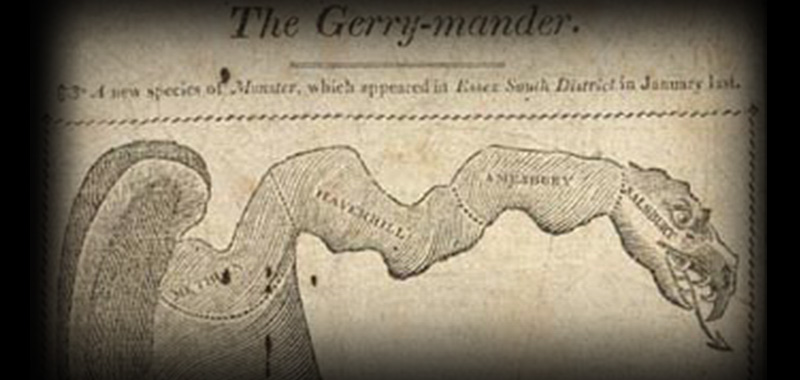As ‘gerrymandering’ turns 205, is there a real chance for reform in North Carolina?

On this day in 1812, a political cartoon in the Boston Gazette first coined the term “gerrymander” to describe oddly shaped electoral districts designed to virtually ensure victory for one party over the other.
The name is a mixture of the word “salamander,” in reference to the lizard-like silhouette of one of the districts in question, and the name of then-Massachusetts Gov. Elbridge Gerry, whose party unfairly drew the map to favor its own candidates.
Gerry, who ironically was never much of a partisan himself, reluctantly signed off on the map manipulation, which proved successful for his party – but not so much for him. Gerry lost his re-election bid for governor, in part because of public backlash over the district-rigging scheme.
Today his otherwise impressive resume that includes signing the Declaration of Independence and championing the Bill of Rights is instead eclipsed by the scourge of gerrymandering, which continues to undermine the principle of fair elections by depriving voters of a real choice at the ballot box.
Voting districts are redrawn every 10 years so as to account for population changes reflected in the latest U.S. Census. But while some other states give redistricting power to an independent body, North Carolina’s districts are crafted by the very politicians whose future elections will be directly impacted by the winding lines.
The result in North Carolina is a lack of competition that deprives voters of a choice in their elections. Since 1992, nearly half of all legislative races have had just one candidate on the ballot, deciding the outcome of these contests before a single ballot is cast. Such a preordained outcome is an insult to voters and an injury to representative democracy.
“You get districts that are so skewed that people just choose not to run for them. And that’s bad for democracy,” says Jane Pinsky, director of the nonpartisan N.C. Coalition for Lobbying and Government Reform.
Democrats indulged in gerrymandering during the decades when they controlled the N.C. General Assembly, letting Republican-sponsored bills to reform the redistricting process languish in committee and die without a vote. And when the GOP was swept into power with the 2010 elections – just in time for the latest round of redistricting – legislative Republicans drew gerrymandered voting maps that entrenched their newfound majority.
“Sadly, this is not something new in North Carolina,” Pinsky says. “The party in power draws legislative districts, and they draw them as much as possible to their own benefit.”
While each side of the aisle has now tasted the sweet and the bitter of gerrymandering, voters have consistently been treated as pawns, shifted from one district to another on the whim and calculations of party politics. However, real reform could finally be on the horizon.
This month, a bipartisan group of North Carolina lawmakers introduced House Bill 200, which would take politics out of the redistricting process. Instead of legislators drawing their own districts for partisan advantage, a nonpartisan legislative staff would create congressional and legislative maps completely blind of any political consideration.
A day after that measure was introduced, hundreds of North Carolinians came to Raleigh for the Citizens Lobby Day to End Gerrymandering. It was a clear sign of overwhelming public support for independent redistricting.
Since gerrymandering first entered the American lexicon 200 years ago, each party has been guilty of the practice. Now both parties can be part of the fix. But it will take citizens throughout our state continuing to stand up and demanding reform in order to get our lawmakers to take note and take action.
“It is a little bit of an uphill battle, because none of us likes to give up power,” Pinsky says. “But we have seen a substantial number of legislators say that they recognize that it’s good government and it’s a change that North Carolina needs in order to move into the 21st century.”
Establishing independent redistricting would at long last remove “gerrymandering” from the front pages of today’s newspapers and relegate it to a footnote in dusty history books where it belongs. And it would finally give North Carolina citizens a real choice and a voice in our elections.
See More: Gerrymandering & Representation
